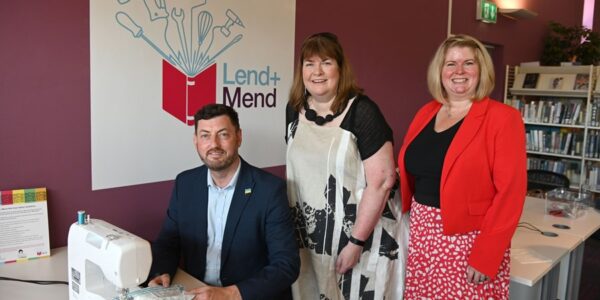Scotland’s first dedicated facilities in public libraries including Wester Hailes, which allow free access to equipment to repair, reuse, and upcycle everyday items, will officially open for community use this month.
As part of a trailblazing project funded by the John Lewis Circular Future Fund, public libraries in key areas across the country will lead the way in developing a long-term model for circular economy activities, while helping to tackle the cost-of-living crisis.
Nine library partners across Scotland have been selected to host a ‘Lend and Mend Hub’ as part of the pilot project managed by the Scottish Library and Information Council (SLIC). One of the first to launch is Wester Hailes Library in Edinburgh which today (Thursday 15 June) officially opened for public use.
Culture Minister Christina McKelvie said:
Our libraries are at the heart of our communities and the first of the pilot ‘Lend and Mend Hubs’ will further enhance the services they provide locally.
Giving people free access to repair or recycle everyday items reflects the Scottish Government’s commitment to sustainability and will be an invaluable resource in the current cost of living crisis.
Edinburgh City Council Leader, Cammy Day, who was at the launch at Wester Hailes Library said:
I was delighted to attend the launch of the ‘Lend and Mend Hub’ pilot scheme today at Wester Hailes Library and see the excellent work that has gone into the initiative. The past year has been extremely challenging with a protracted cost-of-living crisis impacting the lives of many. Our libraries have been working hard to support residents through programmes such as our Warm and Welcoming Spaces which has been successful across the city.
The ‘Lend and Mend Hub’ pilot scheme provides an exciting new way for our libraries to be at the forefront of our communities through the promotion of circular economy activities and providing fresh opportunities for our residents to get involved and learn new skills.
This will not only help with household costs but will foster a new way of thinking about how we use and consume in our daily lives. As part of our 2030 Climate Strategy, we are committed to supporting a circular economy across the city.
We want our libraries to be as innovative, accessible and enriching as possible for our service users, and I am sure that this scheme will make a great addition to our network. I look forward to seeing the scheme progress here in the Capital and more widely across Scotland.

Taking a co-design approach, the hubs have been developed with insight and expertise from local teams and library members to ensure services are tailored to community needs. Funding granted from The John Lewis Partnership’s £1m Circular Future Fund has been used for the equipment, training and space upgrades needed to deliver these promising projects.
Following their launch, each library hub will also introduce an education programme to support new skills development, helping to reduce inequality through equitable access to resources. The first focus will be on ‘mending’, with a series of sewing workshops and repair cafes already underway at some locations.
Pamela Tulloch, chief executive of SLIC, said:
It’s great to see our ‘Lend and Mend Hubs’ take shape in what is an exciting chapter for our libraries. Building on their current offering, our services are transforming and thriving in line with community needs, giving people access to resources they might not otherwise have to support responsible consumption and learning, locally and free.
And at a time when all of Scotland’s communities are experiencing economic and environmental challenges, the role of public libraries has never been more important.
The introduction of this network has the potential to create a real impact. Receiving over 40 million visits every year, the Scottish public are familiar with borrowing from libraries, but don’t always have the opportunity to extend this circular thinking to other aspects of their lives, for example how they use household goods and clothing.
We hope this pilot will help develop a long-term model for libraries to be a hub of circular economy activities, while also providing valuable learnings to promote the urgent need to adopt a more circular way of living more widely for the long-term benefit of us all.
To follow the development of the Lend & Hubs on Facebook.


